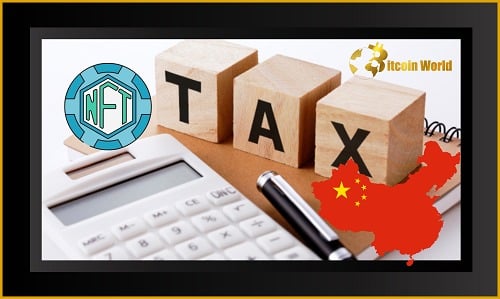China, a nation known for its stringent stance on cryptocurrencies, is surprisingly making waves in the world of Non-Fungible Tokens (NFTs). While the crypto market faces crackdowns, government agencies in Shanghai and Chengdu are quietly stepping into the NFT space. Is this a contradiction, or a strategic embrace of blockchain technology under a different guise? Let’s dive into this intriguing development.
Tax Bureaus in Shanghai and Chengdu Issue NFTs: A Sign of Changing Tides?
In a move that’s turning heads in both the crypto and traditional finance worlds, tax bureaus in Shanghai and Chengdu have launched their own NFTs, utilizing Tencent’s blockchain technology. This isn’t just a small pilot program; it’s a clear signal that even within a tightly regulated environment, the potential of NFTs and blockchain is being recognized and explored by Chinese government bodies.
Here’s a breakdown of what’s happening:
- Shanghai’s Tax Office Goes Digital: On Friday, Shanghai’s tax bureau released 2,000 NFTs. These aren’t just random digital collectibles; they feature the tax office’s mascot, adding a unique and official touch.
- Chengdu Commemorates History with NFTs: Earlier in the week, Chengdu’s tax office distributed 1,000 NFTs. These NFTs are designed to celebrate significant milestones in China’s tax history, blending technology with national pride and historical awareness.
- Timing is Key: These NFT releases coincide with the tax departments’ unveiling of their latest tax regulations in April, suggesting a possible integration of digital innovation with traditional bureaucratic processes.
Non-Transferable NFTs: Keeping Speculation at Bay
There’s a crucial aspect to these government-issued NFTs – they are explicitly non-transferable. This is a significant detail, especially in the context of China’s regulatory environment. By making these NFTs non-transferable, the authorities are likely aiming to:
- Prevent Speculation: China has been firm in its stance against cryptocurrency speculation. Non-transferable NFTs remove the element of market trading and price volatility, aligning with the government’s regulatory goals.
- Focus on Utility and Engagement: Instead of being investment assets, these NFTs are designed for engagement, commemoration, and potentially, future utility within government services.
- Control the Narrative: By controlling the issuance and preventing secondary markets, the government maintains oversight and ensures the NFTs are used as intended.
Why Are Chinese Government Agencies Warming Up to NFTs?
Given China’s strict regulations on crypto and crypto exchanges, this foray into NFTs by government agencies might seem paradoxical. However, there are compelling reasons why China is exploring NFTs, particularly in the government sector:
- Blockchain for Cultural Industry Development: Chinese financial sector groups recognize the potential of blockchain technology to boost the cultural industry. NFTs are seen as a tool to digitize and promote cultural assets, heritage, and national identity.
- Embracing Technology, Curbing Crypto Speculation: China’s approach seems to be about leveraging the underlying technology of blockchain (which NFTs are built upon) while strictly controlling or eliminating the speculative aspects associated with cryptocurrencies.
- Government Innovation and Modernization: Adopting NFTs can be viewed as a step towards modernizing government services and engaging with citizens in new, innovative ways. Digital tokens can represent achievements, commemorate events, or even provide access to services in the future.
Telecom and Space Agencies Join the NFT Trend: A Wider Government Push?
The NFT initiatives aren’t limited to tax bureaus. Recent reports highlight that other major state-backed entities are also embracing NFTs:
- China Telecom’s NFT Marketplace: Just last week, telecom giant China Telecom established its own NFT marketplace. This signals a significant commercial interest and infrastructure development for NFTs within China’s digital landscape.
- China National Space Administration’s Space Day NFTs: To celebrate China Space Day, the China National Space Administration released NFTs. This move uses NFTs for national pride, education, and to commemorate achievements in space exploration.
These examples suggest a broader, potentially government-led initiative to explore and utilize NFTs within specific, controlled parameters. It’s a calculated approach, differentiating between the technology and the speculative crypto market.
What Does This Mean for the Future of NFTs and Crypto in China?
While China maintains a firm grip on cryptocurrencies and crypto exchanges, the adoption of NFTs by government agencies and state-owned enterprises presents a nuanced picture. Here’s what we can infer:
- Blockchain is Welcome, Crypto Speculation is Not: China appears to be selectively embracing blockchain technology, particularly for applications like NFTs that can be controlled and utilized without the speculative volatility of cryptocurrencies.
- NFTs as Tools for Government and Culture: The focus on non-transferable NFTs and their use by tax bureaus, telecom companies, and space agencies indicates a potential path for NFTs as tools for government communication, cultural promotion, and digital engagement, rather than as investment vehicles.
- A Unique NFT Ecosystem in China: China might be developing its own distinct NFT ecosystem, one that operates under strict regulatory control and potentially focuses on utility and cultural value rather than open market trading and speculation.
Conclusion: China’s Calculated NFT Experiment
The move by Chinese government agencies to issue NFTs is a fascinating development. It underscores a crucial point: blockchain technology, in its various forms, is still being explored and adopted even in regions with strict crypto regulations. China’s approach to NFTs is distinct – focusing on control, utility, and cultural application while distancing itself from the speculative frenzy often associated with the broader crypto market. As more government bodies and state-backed entities venture into the NFT space, it will be crucial to watch how this unique ecosystem evolves and what it signals for the future of digital assets in China and beyond.
Related Post: Elon Musk, a Dogecoin supporter, has decided not to join the Twitter board of directors
Disclaimer: The information provided is not trading advice, Bitcoinworld.co.in holds no liability for any investments made based on the information provided on this page. We strongly recommend independent research and/or consultation with a qualified professional before making any investment decisions.




